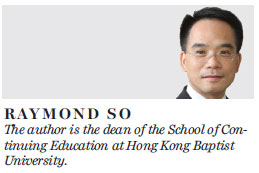Education survey results should be read with care
Updated: 2016-09-15 08:01
By Raymond So(HK Edition)
|
|||||||||
Response feedback is an important input to improvement, and education is no exception. It is for this simple reason that surveys are conducted by the Education Bureau (EDB) on a regular basis. The objective is simple: To obtain data for analysis and seek improvements in education. Last week, the EDB announced the results of the triennial "Survey on Opinions of Employers on Major Aspects of Performance" for first-degree (subsidized or self-financed) and sub-degree graduates. In order to uphold neutrality and creditability, the EDB has commissioned an independent organization to carry out the surveys.
The sample includes the employers of more than 1,300 first-degree graduates, as well as the employers of more than 700 sub-degree graduates. The employers were asked questions in the following nine areas: (i) language proficiency in Cantonese, English, Putonghua and other languages; (ii) numerical competency; (iii) information technology literacy; (iv) analytical and problem-solving abilities; (v) work attitudes; (vi) interpersonal skills; (vii) management skills; (viii) technical knowledge required for the job; and (ix) knowledge of current affairs and business issues, self-learning ability and self-esteem.

In this survey, respondents were asked to assign a mark from one to five, with five being the full credit. Unless respondents have very strong views on the graduates' performance, very seldom will they assign a one or a five because the subjects are just new graduates. A typical score will range from two to four.
First, we look at the performance of the first-degree graduates. Almost 97 percent of the employers said that they are quite satisfied or very satisfied with the performance of first-degree graduates. The average score for the first-degree graduates is 3.62, a record high since 1998. When we look at the various criteria, first-degree graduates excel in the fields of work attitude, knowledge, language ability and ability to use information technology. However, they only scored 2.89 in the knowledge of "China trade/economic development". This indicates that the young first-degree graduates do not possess sufficient holistic knowledge about economic development on the mainland.
Then we look at the performance of the sub-degree graduates. Among employers surveyed, more than 60 percent of employers said that they are quite satisfied or very satisfied with the performance of sub-degree graduates; the sub-degree graduates' overall score was 3.35. When we compare the results with previous years, this year's are not encouraging as they are the lowest in the past 10 years. The sub-degree graduates perform better in IT, work attitude, interpersonal skills and language proficiency, but they are relatively weak in judgment and ability to work independently.
Many commentators criticized the effectiveness of sub-degree education when they looked at these results. On the surface, such criticisms are not without foundation. However, some thoughtful people suggest that we should be careful when we make such comments. The first consideration is that there is a natural selection bias in the samples. First-degree graduates, by definition, receive higher education than sub-degree graduates. It is not surprising for first-degree graduates perform better than sub-degree graduates do.
In addition, many sub-degree graduates continue their studies to earn a degree. This implies that those sub-degree graduates who join the workplace right after their sub-degree graduation normally perform less well academically. When the same questions are being applied to both first-degree and sub-degree graduates, it is logical to see higher scores among first-degree graduates.
Besides, many sub-degree programs focus on vocational training, which is different from first-degree programs; therefore a direct comparison is not ideal. Hence, the conclusions should be read with careful analysis to avoid falling into the trap of comparing apples with oranges. However, one clear message is there: If sub-degree graduates can progress to first-degree places either through subsidized or self-financed top-up degrees, their work performance will improve and they will make a greater contribution to Hong Kong. This is the power of education.
Another interesting result is that employers found that work attitudes and interpersonal skills are among the most important qualities today's young people need to improve.
(HK Edition 09/15/2016 page7)